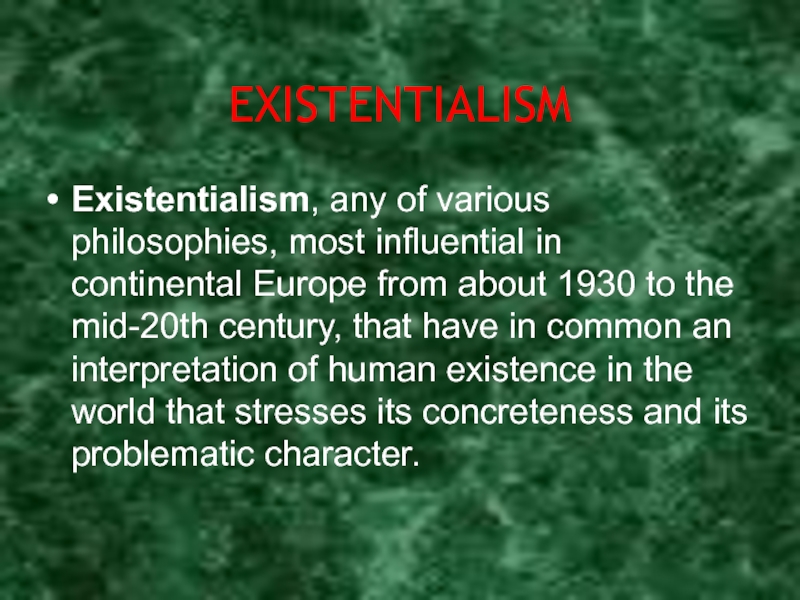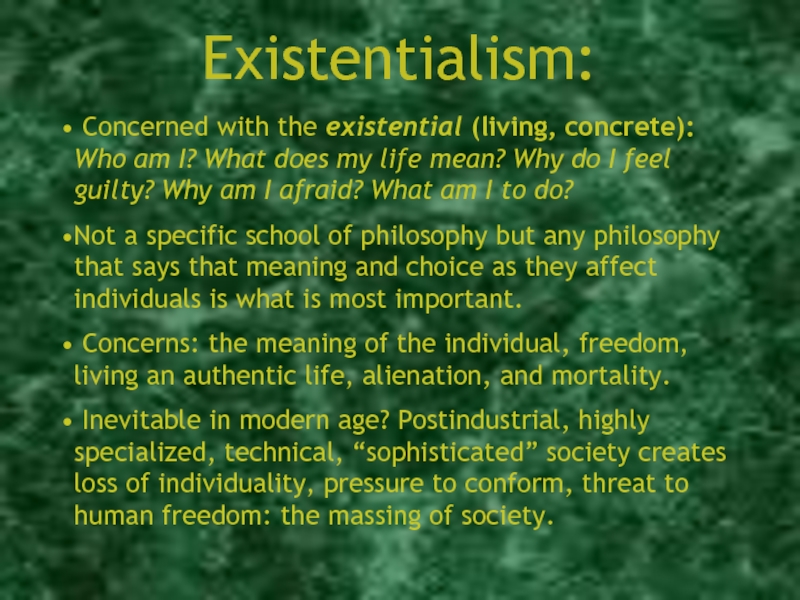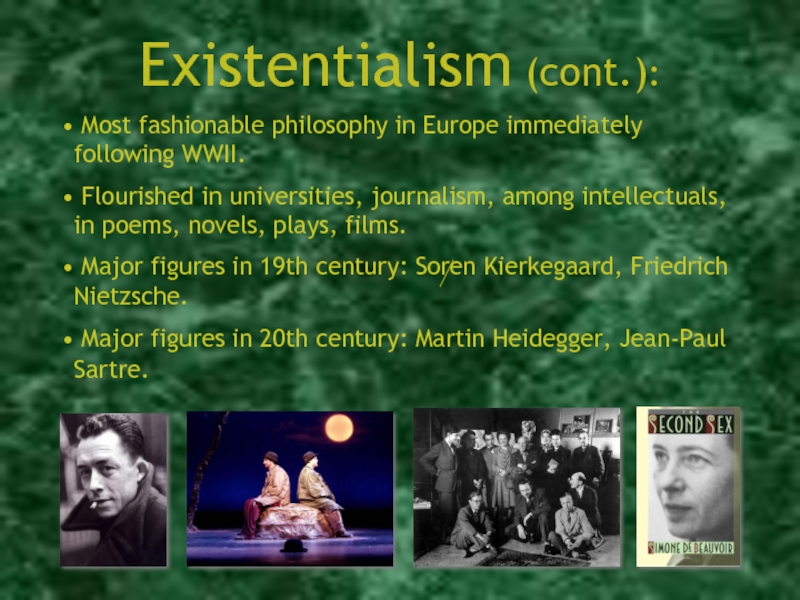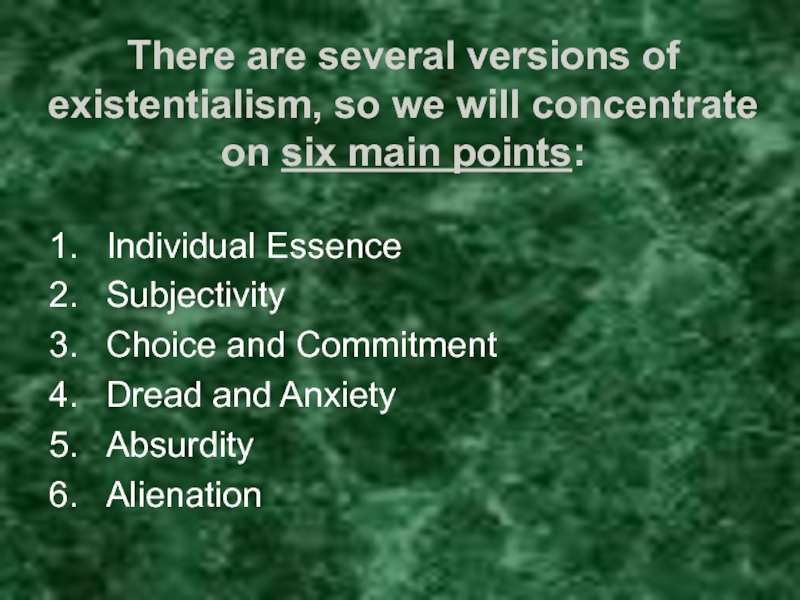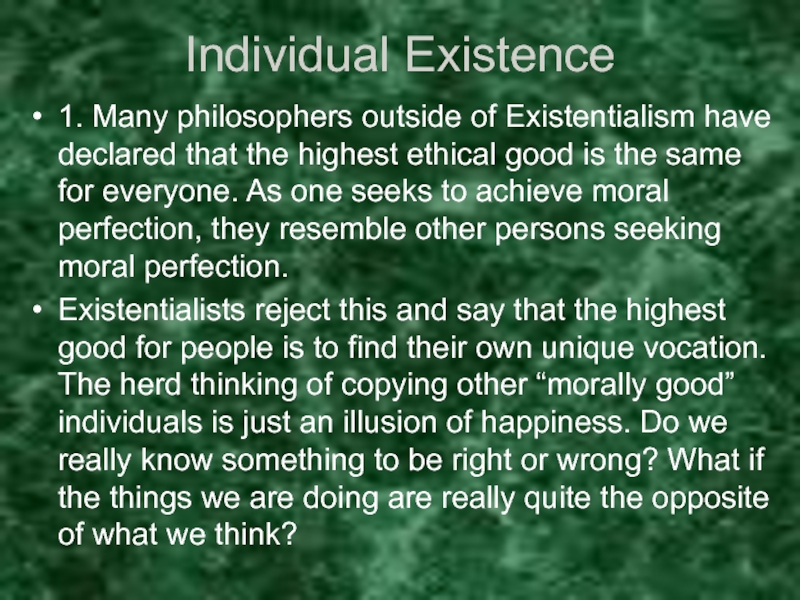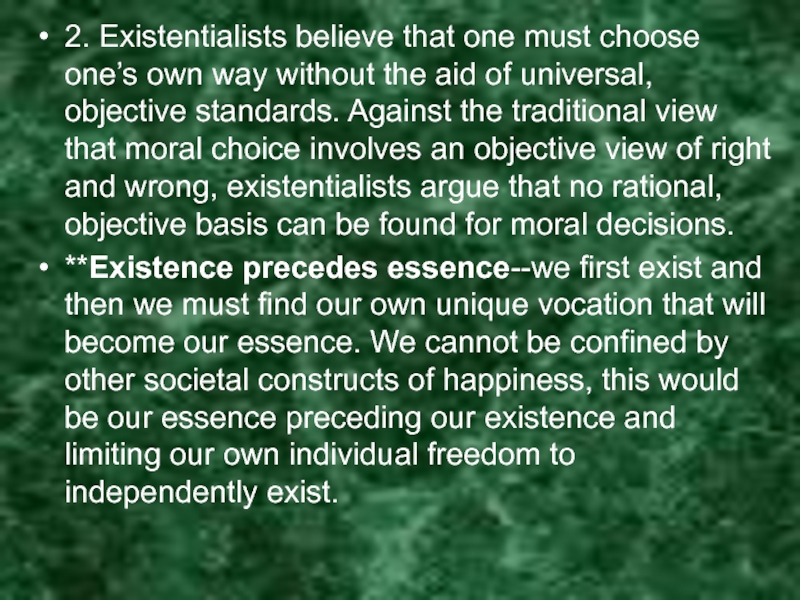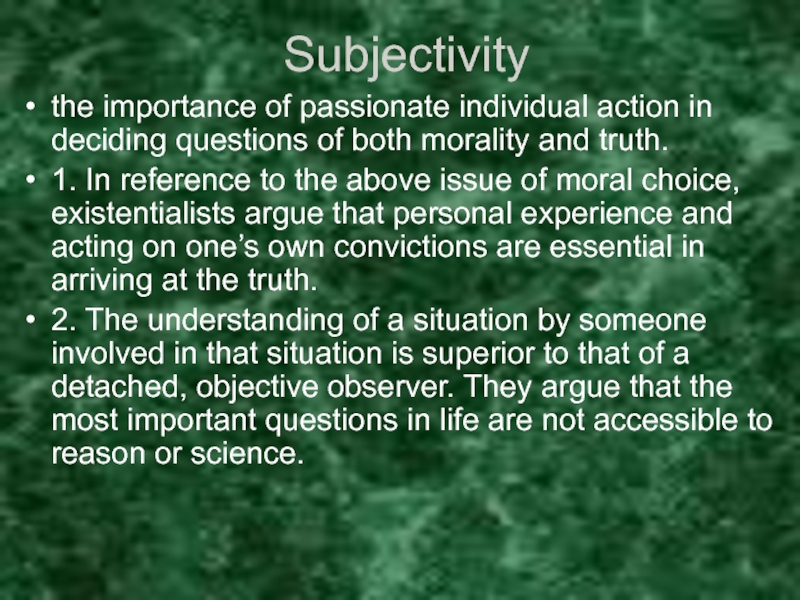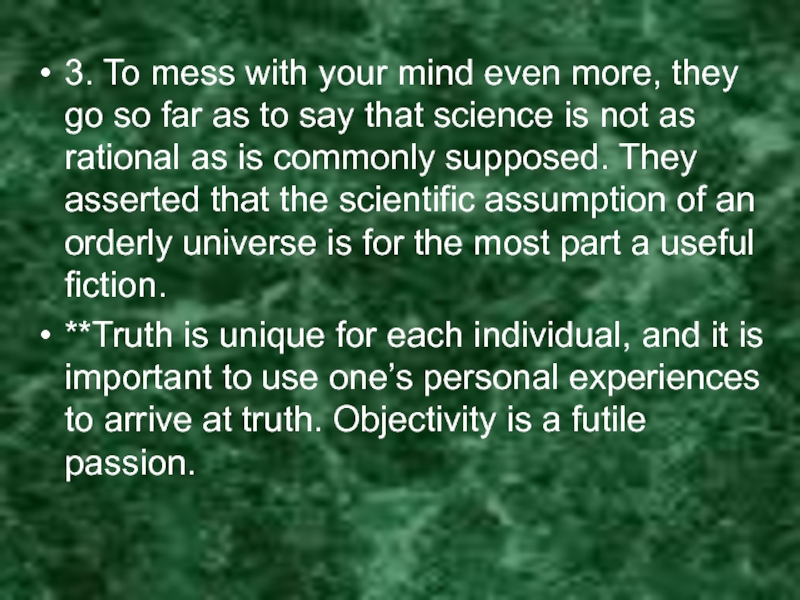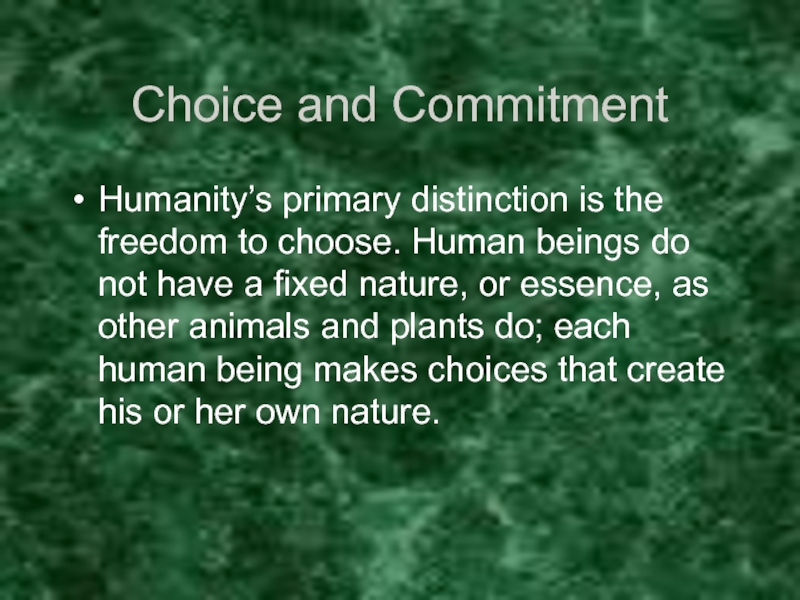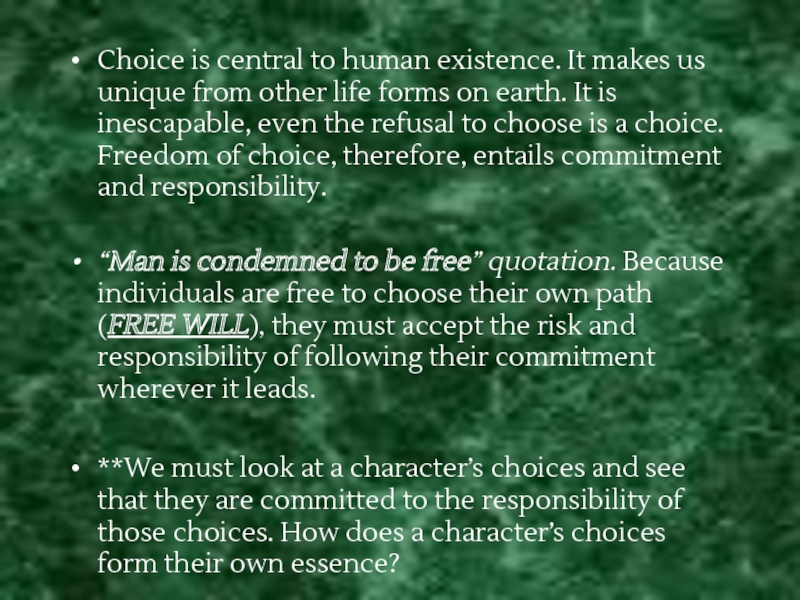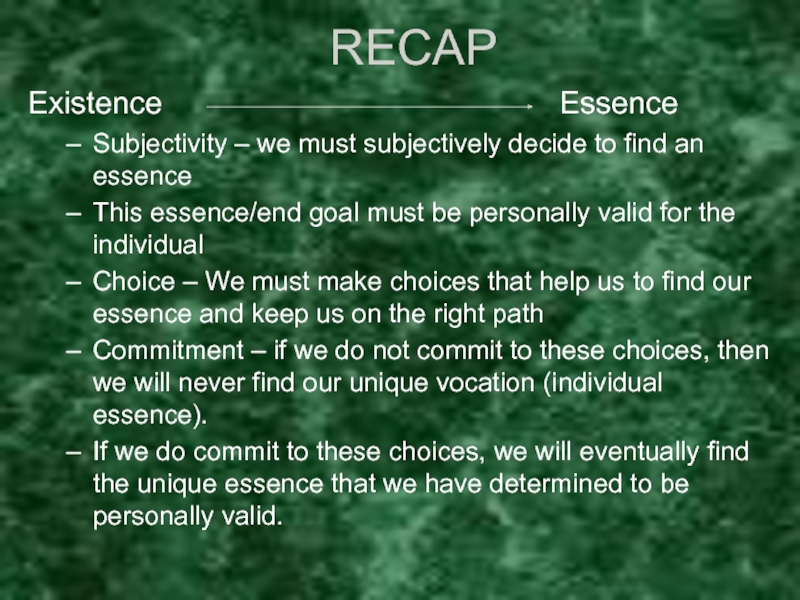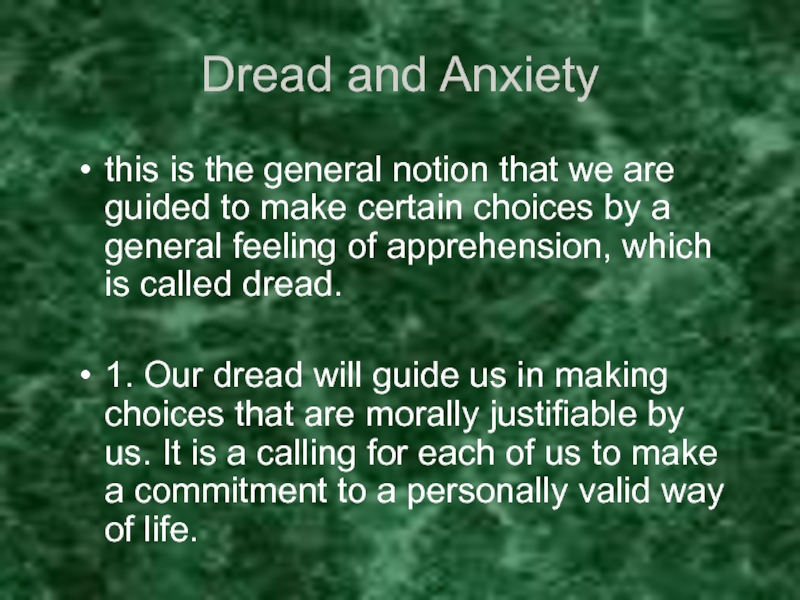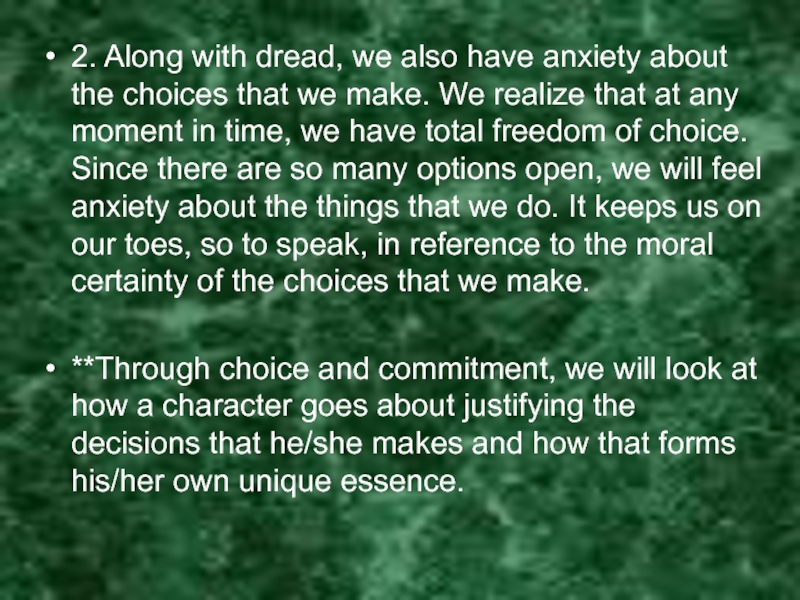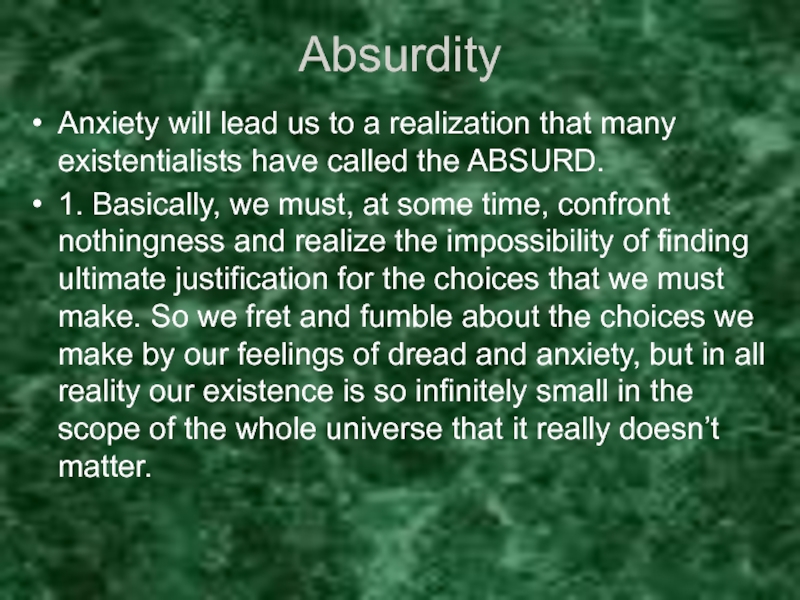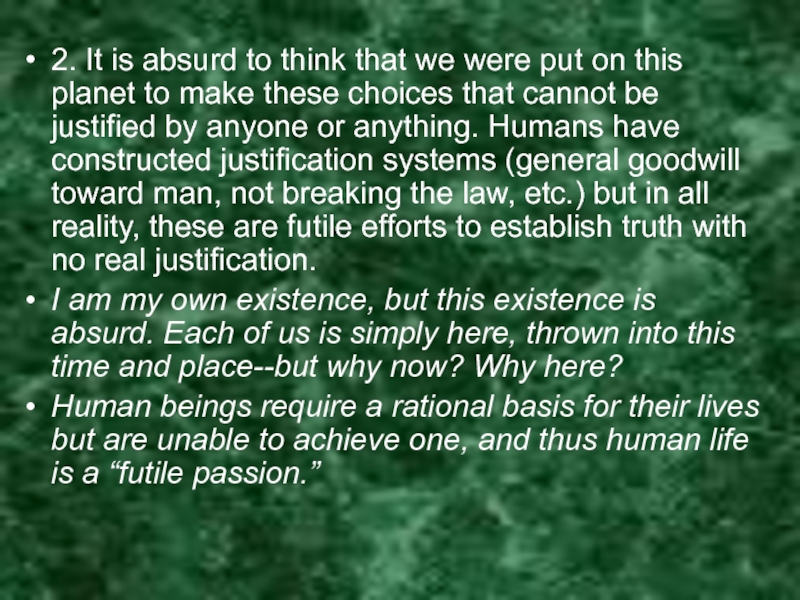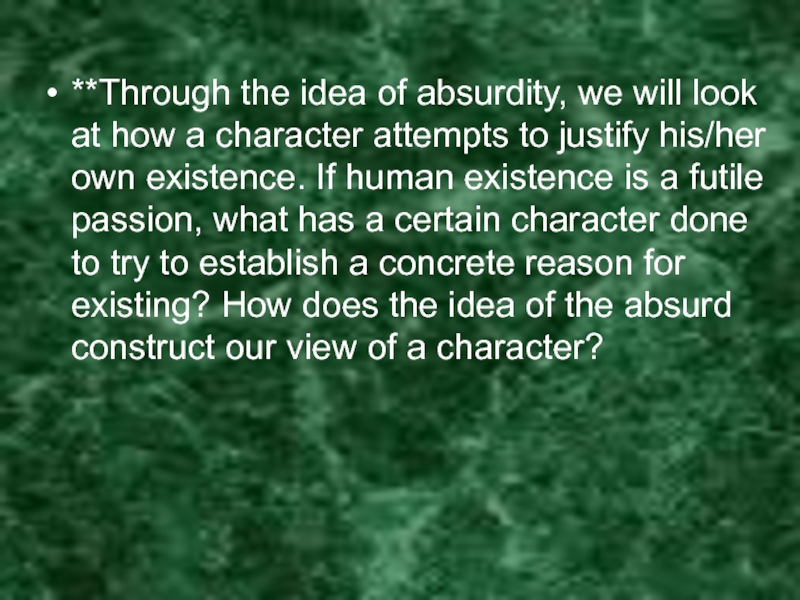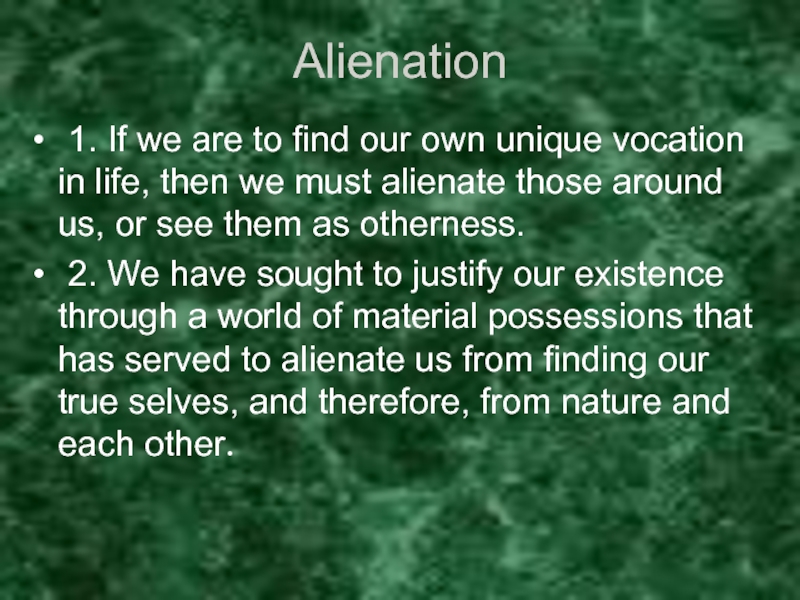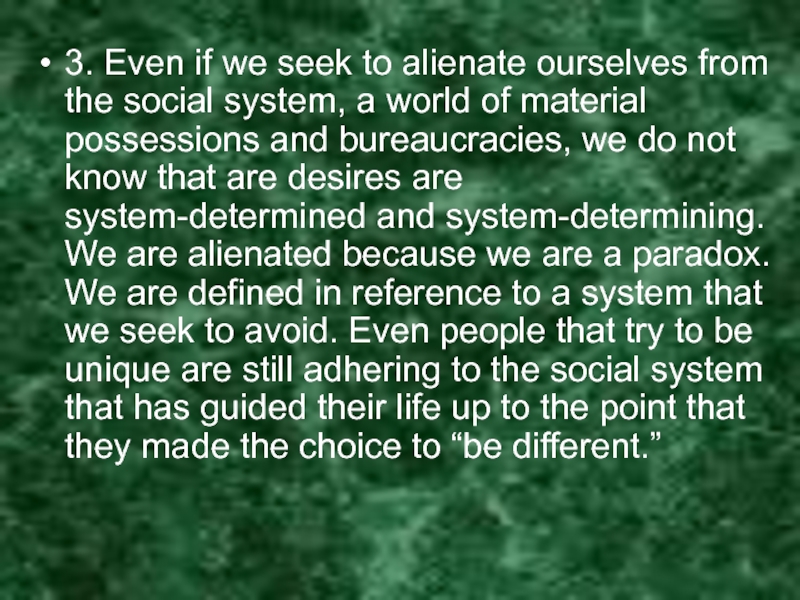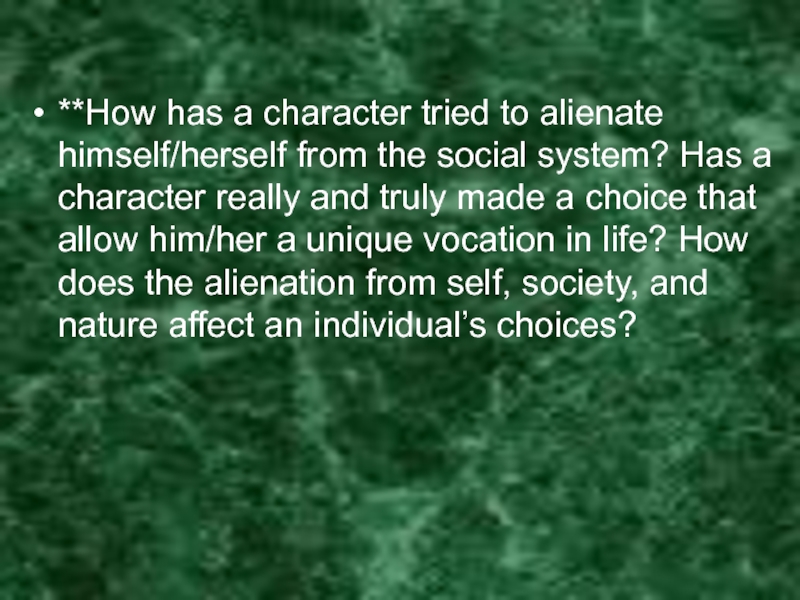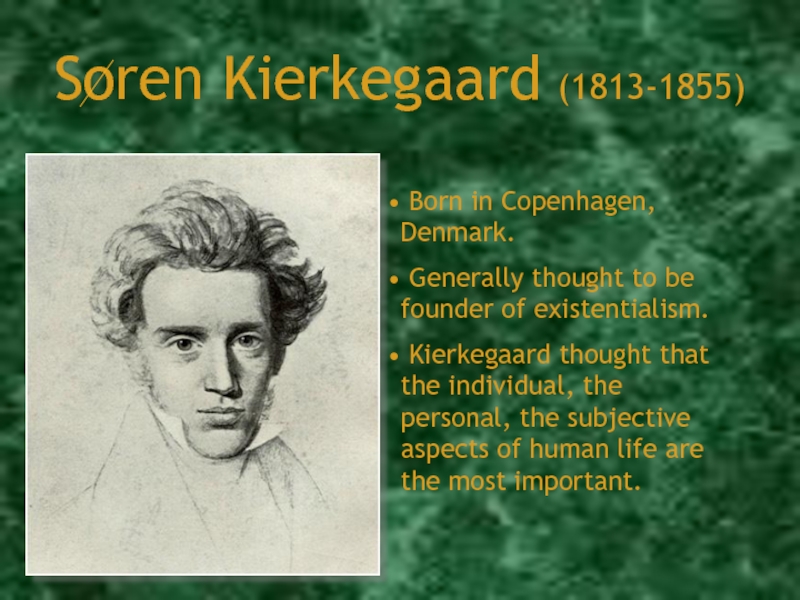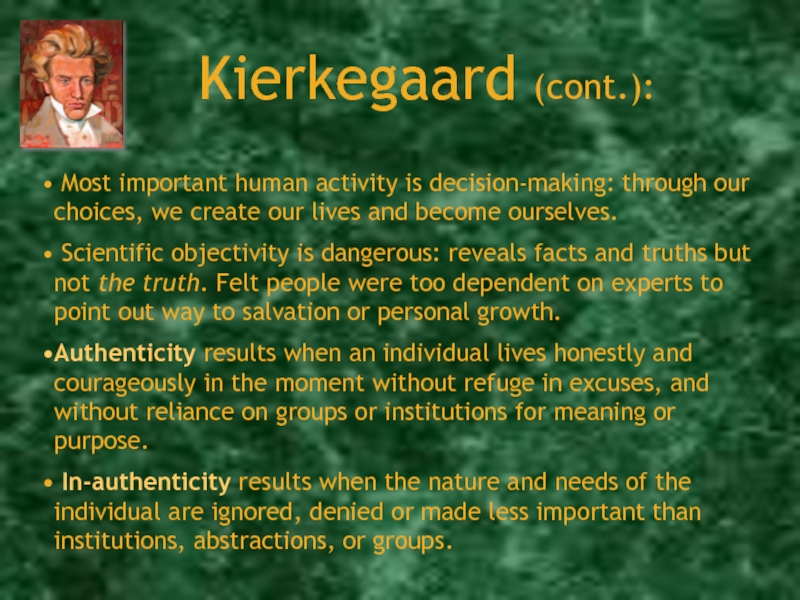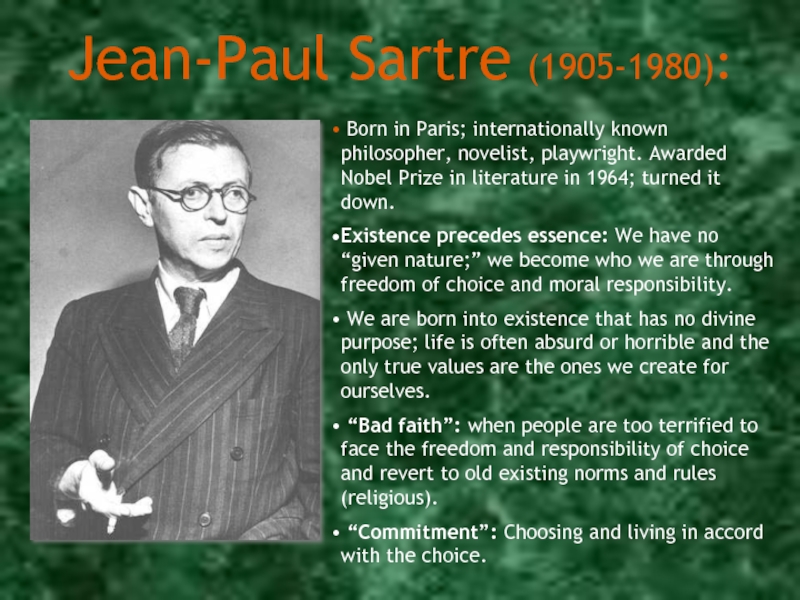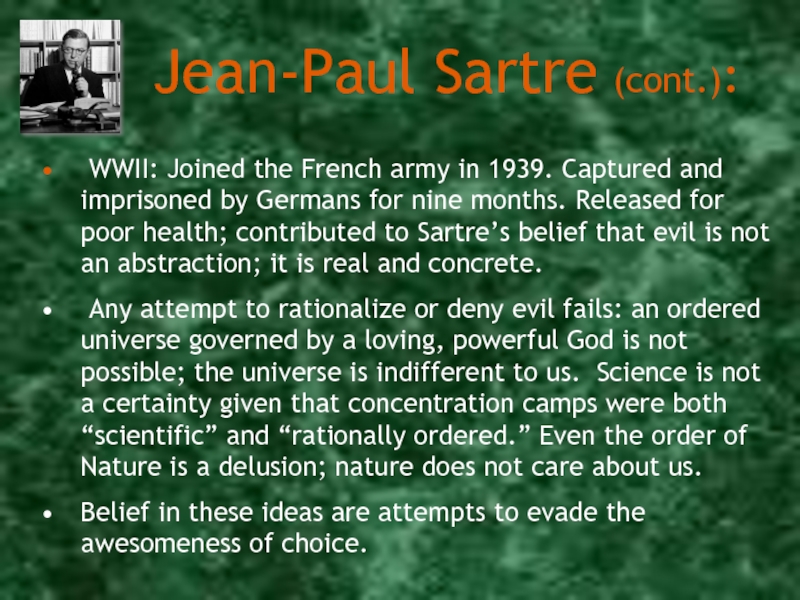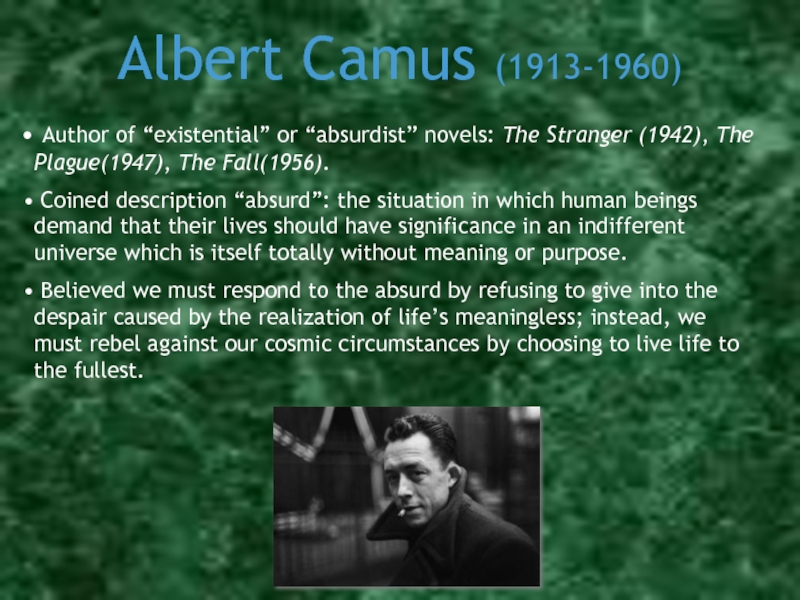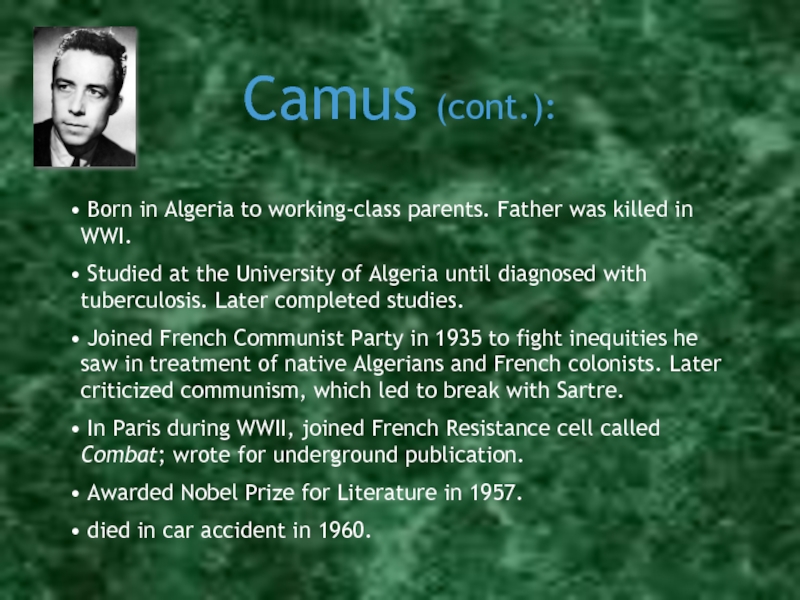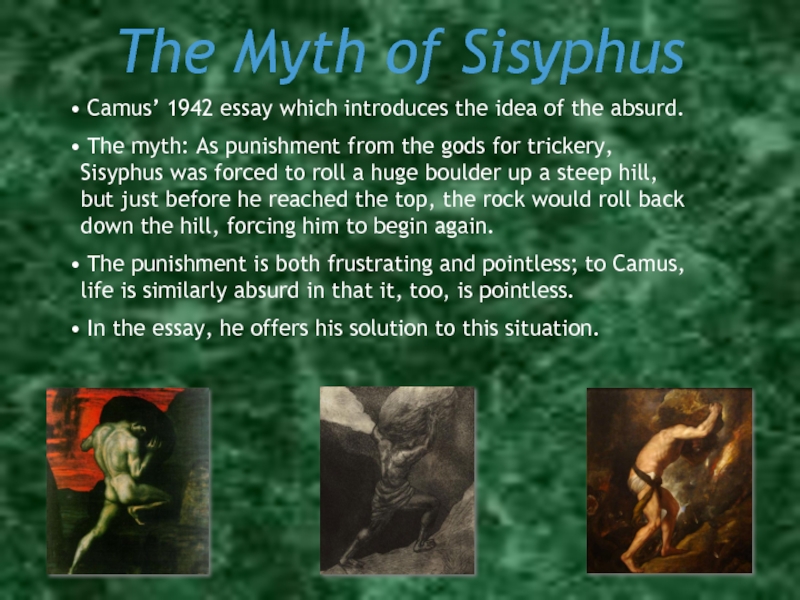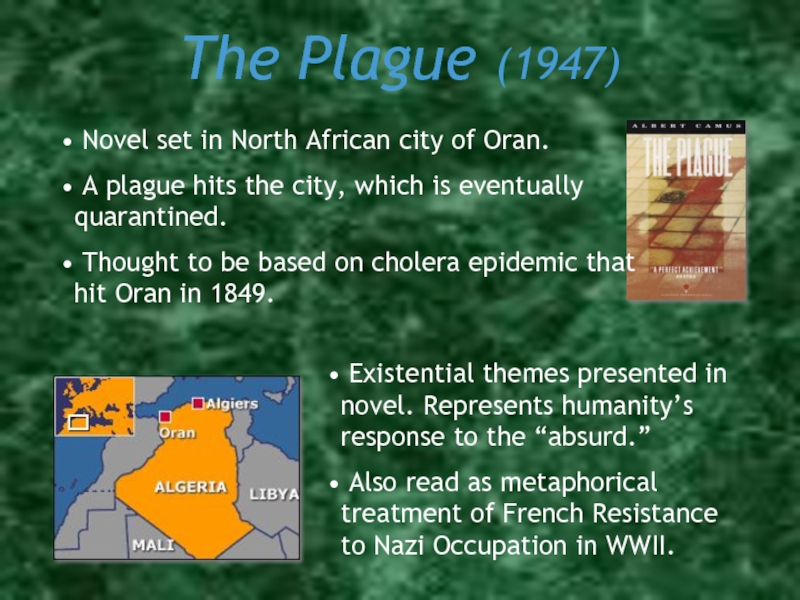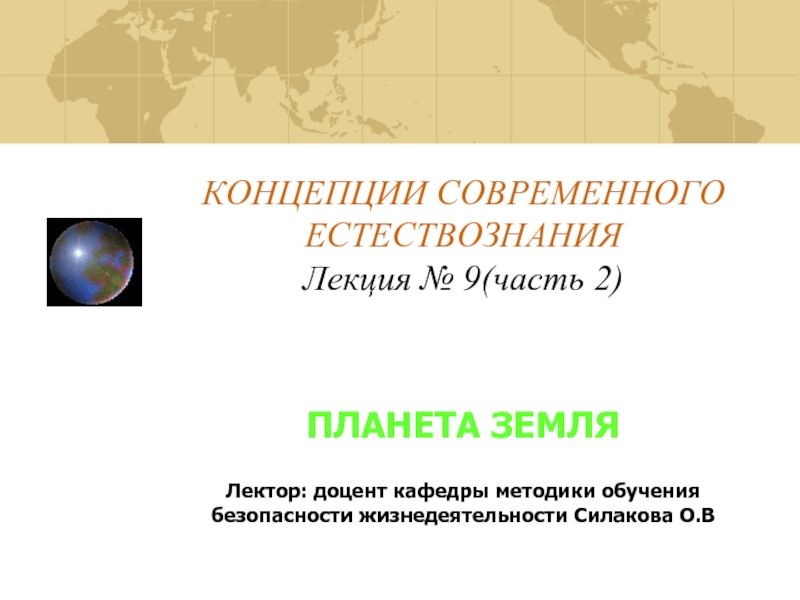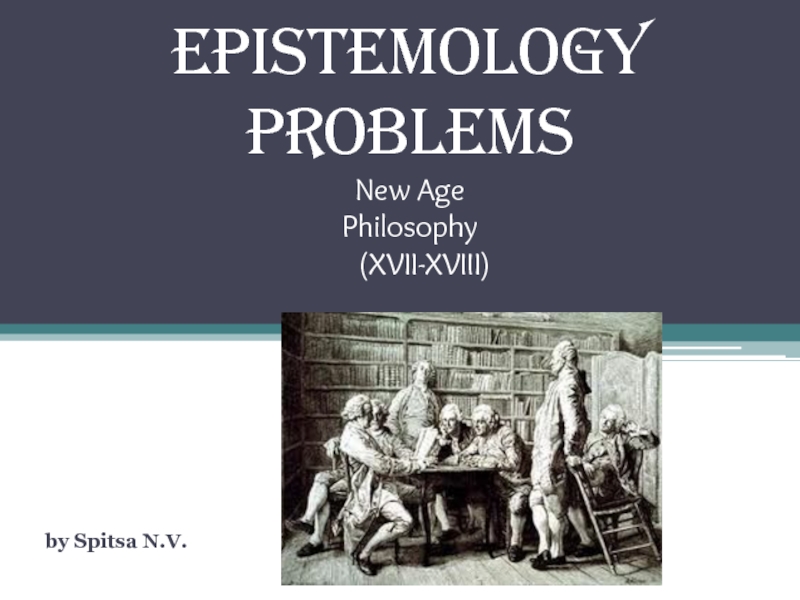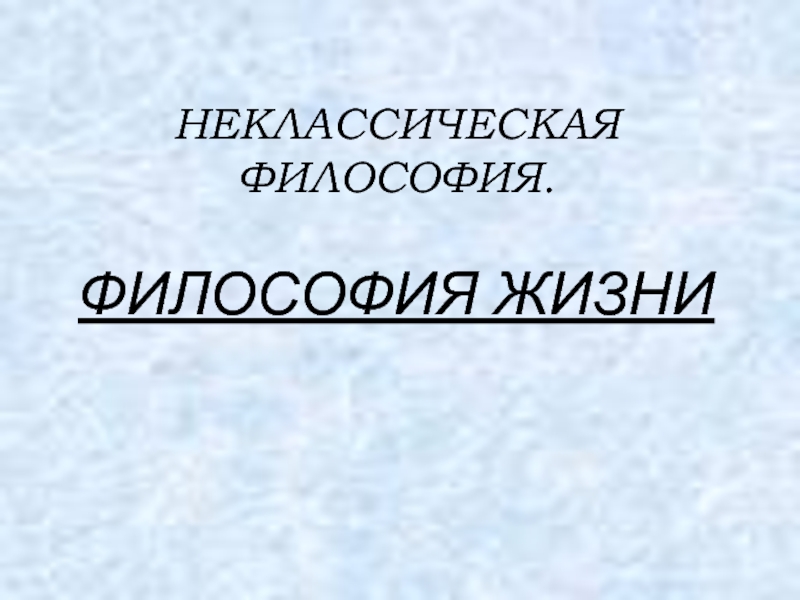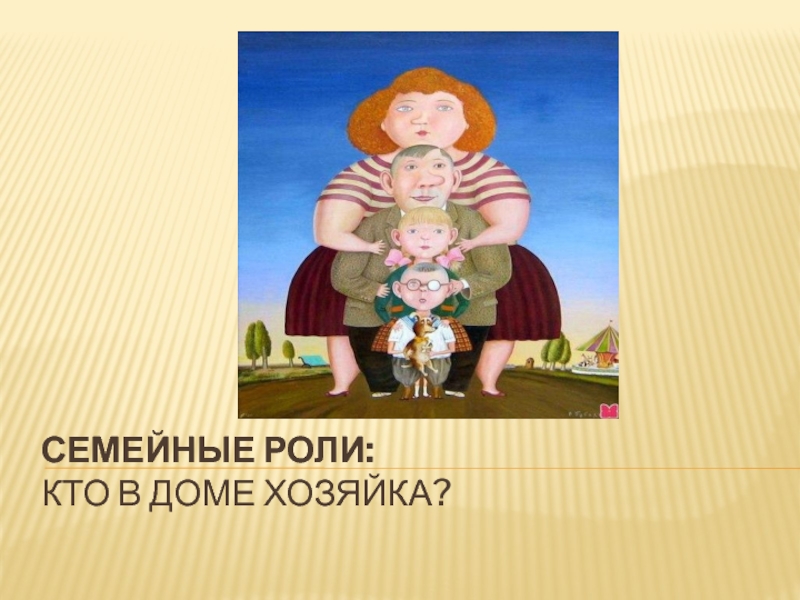- Главная
- Разное
- Дизайн
- Бизнес и предпринимательство
- Аналитика
- Образование
- Развлечения
- Красота и здоровье
- Финансы
- Государство
- Путешествия
- Спорт
- Недвижимость
- Армия
- Графика
- Культурология
- Еда и кулинария
- Лингвистика
- Английский язык
- Астрономия
- Алгебра
- Биология
- География
- Детские презентации
- Информатика
- История
- Литература
- Маркетинг
- Математика
- Медицина
- Менеджмент
- Музыка
- МХК
- Немецкий язык
- ОБЖ
- Обществознание
- Окружающий мир
- Педагогика
- Русский язык
- Технология
- Физика
- Философия
- Химия
- Шаблоны, картинки для презентаций
- Экология
- Экономика
- Юриспруденция
Existentialism презентация
Содержание
- 1. Existentialism
- 2. Existentialism: Concerned with the existential (living,
- 3. Existentialism (cont.): Most fashionable philosophy
- 4. There are several versions of existentialism, so
- 5. Individual Existence 1. Many philosophers outside of
- 6. 2. Existentialists believe that one must choose
- 7. Subjectivity the importance of passionate individual action
- 8. 3. To mess with your mind even
- 9. Choice and Commitment Humanity’s primary distinction is
- 10. Choice is central to human existence. It
- 11. RECAP Existence
- 12. Dread and Anxiety this is the general
- 13. 2. Along with dread, we also have
- 14. Absurdity Anxiety will lead us to a
- 15. 2. It is absurd to think that
- 16. **Through the idea of absurdity, we will
- 17. Alienation 1. If we are to find
- 18. 3. Even if we seek to alienate
- 19. **How has a character tried to alienate
- 20. Soren Kierkegaard (1813-1855) Born in Copenhagen,
- 21. Kierkegaard (cont.): Most important human activity
- 22. Jean-Paul Sartre (1905-1980): Born in Paris;
- 23. Jean-Paul Sartre (cont.): WWII: Joined the
- 24. Albert Camus (1913-1960) Author of “existential”
- 25. Camus (cont.): Born in Algeria to
- 26. The Myth of Sisyphus Camus’ 1942
- 27. The Plague (1947) Novel set in
Слайд 1EXISTENTIALISM
Existentialism, any of various philosophies, most influential in continental Europe from about 1930
Слайд 2Existentialism:
Concerned with the existential (living, concrete): Who am I? What
Not a specific school of philosophy but any philosophy that says that meaning and choice as they affect individuals is what is most important.
Concerns: the meaning of the individual, freedom, living an authentic life, alienation, and mortality.
Inevitable in modern age? Postindustrial, highly specialized, technical, “sophisticated” society creates loss of individuality, pressure to conform, threat to human freedom: the massing of society.
Слайд 3Existentialism (cont.):
Most fashionable philosophy in Europe immediately following WWII.
Flourished
Major figures in 19th century: Soren Kierkegaard, Friedrich Nietzsche.
Major figures in 20th century: Martin Heidegger, Jean-Paul Sartre.
Слайд 4There are several versions of existentialism, so we will concentrate on
Individual Essence
Subjectivity
Choice and Commitment
Dread and Anxiety
Absurdity
Alienation
Слайд 5Individual Existence
1. Many philosophers outside of Existentialism have declared that the
Existentialists reject this and say that the highest good for people is to find their own unique vocation. The herd thinking of copying other “morally good” individuals is just an illusion of happiness. Do we really know something to be right or wrong? What if the things we are doing are really quite the opposite of what we think?
Слайд 62. Existentialists believe that one must choose one’s own way without
**Existence precedes essence--we first exist and then we must find our own unique vocation that will become our essence. We cannot be confined by other societal constructs of happiness, this would be our essence preceding our existence and limiting our own individual freedom to independently exist.
Слайд 7Subjectivity
the importance of passionate individual action in deciding questions of both
1. In reference to the above issue of moral choice, existentialists argue that personal experience and acting on one’s own convictions are essential in arriving at the truth.
2. The understanding of a situation by someone involved in that situation is superior to that of a detached, objective observer. They argue that the most important questions in life are not accessible to reason or science.
Слайд 83. To mess with your mind even more, they go so
**Truth is unique for each individual, and it is important to use one’s personal experiences to arrive at truth. Objectivity is a futile passion.
Слайд 9Choice and Commitment
Humanity’s primary distinction is the freedom to choose. Human
Слайд 10Choice is central to human existence. It makes us unique from
“Man is condemned to be free” quotation. Because individuals are free to choose their own path (FREE WILL), they must accept the risk and responsibility of following their commitment wherever it leads.
**We must look at a character’s choices and see that they are committed to the responsibility of those choices. How does a character’s choices form their own essence?
Слайд 11RECAP
Existence
Subjectivity – we must subjectively decide to find an essence
This essence/end goal must be personally valid for the individual
Choice – We must make choices that help us to find our essence and keep us on the right path
Commitment – if we do not commit to these choices, then we will never find our unique vocation (individual essence).
If we do commit to these choices, we will eventually find the unique essence that we have determined to be personally valid.
Слайд 12Dread and Anxiety
this is the general notion that we are guided
1. Our dread will guide us in making choices that are morally justifiable by us. It is a calling for each of us to make a commitment to a personally valid way of life.
Слайд 132. Along with dread, we also have anxiety about the choices
**Through choice and commitment, we will look at how a character goes about justifying the decisions that he/she makes and how that forms his/her own unique essence.
Слайд 14Absurdity
Anxiety will lead us to a realization that many existentialists have
1. Basically, we must, at some time, confront nothingness and realize the impossibility of finding ultimate justification for the choices that we must make. So we fret and fumble about the choices we make by our feelings of dread and anxiety, but in all reality our existence is so infinitely small in the scope of the whole universe that it really doesn’t matter.
Слайд 152. It is absurd to think that we were put on
I am my own existence, but this existence is absurd. Each of us is simply here, thrown into this time and place--but why now? Why here?
Human beings require a rational basis for their lives but are unable to achieve one, and thus human life is a “futile passion.”
Слайд 16**Through the idea of absurdity, we will look at how a
Слайд 17Alienation
1. If we are to find our own unique vocation in
2. We have sought to justify our existence through a world of material possessions that has served to alienate us from finding our true selves, and therefore, from nature and each other.
Слайд 183. Even if we seek to alienate ourselves from the social
Слайд 19**How has a character tried to alienate himself/herself from the social
Слайд 20Soren Kierkegaard (1813-1855)
Born in Copenhagen, Denmark.
Generally thought to be
Kierkegaard thought that the individual, the personal, the subjective aspects of human life are the most important.
Слайд 21Kierkegaard (cont.):
Most important human activity is decision-making: through our choices,
Scientific objectivity is dangerous: reveals facts and truths but not the truth. Felt people were too dependent on experts to point out way to salvation or personal growth.
Authenticity results when an individual lives honestly and courageously in the moment without refuge in excuses, and without reliance on groups or institutions for meaning or purpose.
In-authenticity results when the nature and needs of the individual are ignored, denied or made less important than institutions, abstractions, or groups.
Слайд 22Jean-Paul Sartre (1905-1980):
Born in Paris; internationally known philosopher, novelist, playwright.
Existence precedes essence: We have no “given nature;” we become who we are through freedom of choice and moral responsibility.
We are born into existence that has no divine purpose; life is often absurd or horrible and the only true values are the ones we create for ourselves.
“Bad faith”: when people are too terrified to face the freedom and responsibility of choice and revert to old existing norms and rules (religious).
“Commitment”: Choosing and living in accord with the choice.
Слайд 23Jean-Paul Sartre (cont.):
WWII: Joined the French army in 1939. Captured
Any attempt to rationalize or deny evil fails: an ordered universe governed by a loving, powerful God is not possible; the universe is indifferent to us. Science is not a certainty given that concentration camps were both “scientific” and “rationally ordered.” Even the order of Nature is a delusion; nature does not care about us.
Belief in these ideas are attempts to evade the awesomeness of choice.
Слайд 24Albert Camus (1913-1960)
Author of “existential” or “absurdist” novels: The Stranger
Coined description “absurd”: the situation in which human beings demand that their lives should have significance in an indifferent universe which is itself totally without meaning or purpose.
Believed we must respond to the absurd by refusing to give into the despair caused by the realization of life’s meaningless; instead, we must rebel against our cosmic circumstances by choosing to live life to the fullest.
Слайд 25Camus (cont.):
Born in Algeria to working-class parents. Father was killed
Studied at the University of Algeria until diagnosed with tuberculosis. Later completed studies.
Joined French Communist Party in 1935 to fight inequities he saw in treatment of native Algerians and French colonists. Later criticized communism, which led to break with Sartre.
In Paris during WWII, joined French Resistance cell called Combat; wrote for underground publication.
Awarded Nobel Prize for Literature in 1957.
died in car accident in 1960.
Слайд 26The Myth of Sisyphus
Camus’ 1942 essay which introduces the idea
The myth: As punishment from the gods for trickery, Sisyphus was forced to roll a huge boulder up a steep hill, but just before he reached the top, the rock would roll back down the hill, forcing him to begin again.
The punishment is both frustrating and pointless; to Camus, life is similarly absurd in that it, too, is pointless.
In the essay, he offers his solution to this situation.
Слайд 27The Plague (1947)
Novel set in North African city of Oran.
Thought to be based on cholera epidemic that hit Oran in 1849.
Existential themes presented in novel. Represents humanity’s response to the “absurd.”
Also read as metaphorical treatment of French Resistance to Nazi Occupation in WWII.
